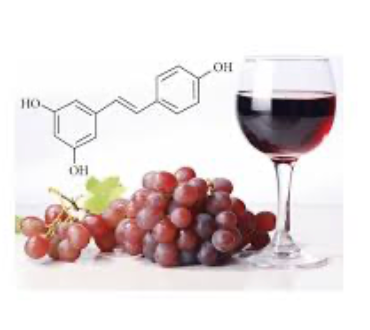Biological Activities of Resveratrol
April 23, 2024 – Steve Bruner

Biological Activities of Resveratrol
Resveratrol is a natural compound found in things like red wine, grapes, and some berries. It's known for having many health benefits, including protecting the heart and brain, reducing inflammation, fighting cancer, and acting as an antioxidant. In fact, research increasingly is showing Resveratrol might be the best antioxidant human beings can take as a supplement.

Antioxidant and Anti-Aging Effects
One of the main features of resveratrol is its ability to fight off damage by antioxidants. It does this by neutralizing harmful molecules called free radicals, which can damage cells and contribute to aging and diseases like cancer. Resveratrol's structure allows it to capture these free radicals, particularly in watery environments, and it also helps prevent fats in foods and drugs from going bad, extending their shelf life. Additionally, resveratrol helps cells survive under stress, such as exposure to UV light or harmful chemicals.
In a increasingly processed, synthetic environment, antioxidants like Resveratrol may play a significant role in good health.
The Problem with Resveratrol
Despite its benefits, resveratrol is not easily absorbed by the body. Scientists are trying to modify resveratrol to increase its absorption and effectiveness, particularly in foods and medical products. They've created versions of resveratrol that are better at preventing the oxidation of fats in the bloodstream, which is important for preventing heart disease.
Most of the resveratrol products on the market come from highly processed polygonum cuspidatum commonly called Japanese knot root. You will see claims it has as much as 99% trans-resveratrol, the active ingredient in resveratrol. The problem is, even then, less than 5% is bioavailable. So, some companies add in grape by-products, but this alone will not and has not increased the bioavailablity.
Ironically, French Red Wine Grapes from the Rhone Valley processed delicately yield about 8-12% trans-resveratrol that is over 93% bio-available. There is something about these grapes that improve the efficacy of trans-resveratrol, perhaps because of the nature of grapes containing other antioxidants properties. Scientist are studying this phenomenon to figure out why these grapes provide a benefit other forms of resveatrol do not.
Natural Biology has been studying and following the research of resveatrol since 2008 and we are convinced the processing methods used in polygonum cuspidatum are eventually harmful because of excessive chemical residues. Even if they weren't most of the trans-resveratrol is not bioavailable and the efficacy is low at best. On the other side of the coin, Vintage Resveratrol 100% uses only French Red Wine Grapes that are pure, naturally freeze-dried processed, and all of the natural inherit properties of the grape, trans-resveratrol, polyphenols, anthocyanins, and other antioxidant properties remain in tact.
Of course, if you trust the internet marketing companies who recommend resveratrol, they're going to recommend the readily available cheap forms of polygonum cuspidatum. We suggest you trust the scientist. At the conclusion of this article we list sources for your own research.
Personal Note: As founder of Natural Biology, my speciality is antioxidants. I've formulated many products using almost every antioxidant known. Through the years, I have increasingly become convinced there are a few antioxidants we should take. it does not mean the others are bad, just that the ones I recommend and take are that much better. Okay, Resveratrol found in Vintage Resveratrol 100% is the best of them all followed by Green Tea Extracts in various forms, and CoQ10 if you take statin drugs for chloresterol management. Naturally, we all need Vitamin C, Vitamin D, and Vitamin E in various forms, the best being in foods we eat but often in supplements also. Some antioxidants found naturally in Chlorella or Spirulina have synegestic benefits and are worthy of consideration, but if you take any form of an antioxidant, consider Vintage Resveratrol 100% first and then add other forms. (Steve Bruner)
Cancer-Fighting Properties
Resveratrol has shown promise in fighting cancer at every stage—starting, growing, and spreading. It works in various ways: by slowing down the growth of cancer cells, promoting the natural process of cell death in tumors, and interfering with cancer pathways. It has been particularly effective in laboratory and animal studies in reducing the growth of skin, breast, stomach, colon, pancreatic, and prostate cancers.
Resveratrol can also make cancer cells more sensitive to chemotherapy, making these drugs more effective. It has shown potential in reducing the harmful side effects of some chemotherapy drugs, such as damage to the kidneys.
See our YouTube video on Resveratrol - Click Here
In summary, resveratrol is a powerful natural compound with potential benefits for heart health, cancer prevention and treatment, and antioxidant protection. Ongoing research continues to explore its full potential, including its use in combination with other treatments.
